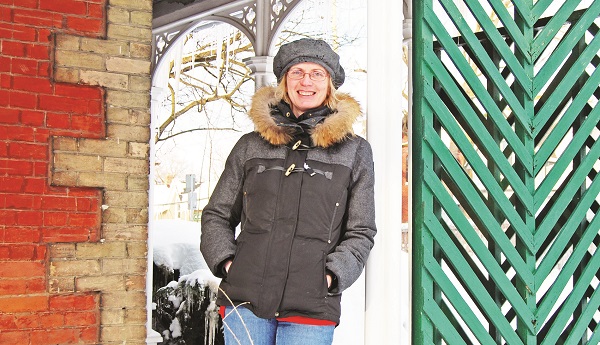Archive
Historical Society president Reiner passes the torch after four years
February 12, 2014 · 0 Comments

By Brock Weir
After moving to Aurora over 23 years ago, one of the first things Suzanne Reiner did was take her kids to the Aurora Museum at Church Street School.
It was her first brush with the Aurora Historical Society (AHS) and over two decades later, Ms. Reiner will sign off Thursday after four years as the society’s president.
Although she plans to continue her involvement with the AHS on a volunteer basis, she will make her final speech to the group’s board on Thursday as she and her family move to Courtice, ON.
“There is so much I still want to do,” says Ms. Reiner. “This has been such a growing experience for me. It has been good for me, and hopefully it has been good for the organization.”
Following her first forays into the AHS, Ms. Reiner was recruited to help steer membership drives before ultimately joining the board and putting herself forward years later when the AHS was in search of a new president.
Looking at that job opportunity, she laughs as she recalls her first thought of, ‘how hard can it be?’ She was soon to find out.
“I thought I knew the behind the scenes aspect of this organization well, but until you’re there, you realise you are actually running a small business and it is more than just membership, guest speakers and putting out a newsletter on a monthly basis,” she says. “What I found challenging, which was ultimately rewarding, was having the opportunity to make a difference.”
Among her goals, she says, was making sure Aurora politicians had a greater appreciation for the work the AHS does in the community in making sure their municipal funding was a line item in the municipal budget rather than a grant, as well as improving the “reputation” of the AHS, which she contends took a hit in the debates in the development of the Aurora Cultural Centre.
The AHS donated over $300,000 of their own funds into the creation what was going to be a “Heritage Centre.” While she says she admires the good work that the Cultural Centre has done in bringing a focal point to the many areas that fall under the “cultural” umbrella, she says during her presidency, she became “frustrated” with the difficulties they faced in carving out permanent heritage space in what used to be their own building.
It was, she adds, an “unfortunate start” to the relationship with hurt feelings and egos on both sides, but the new agreement between the Centre and the Town earmarking one room as a permanent space for a museum has gone a long way.
“We have to look on that building with pride, we have to look on that and know it is beautiful and restored to what we had envisioned,” says Ms. Reiner. “I think we have to walk away thinking now the museum will be there, hopefully that will bring some closure once the building is established.
“I think after the Cultural Centre, our reputation has been very low. I am sure the community and even our members saw how we had mishandled the Centre. ‘Somebody else had another agenda, and we weren’t a part of the agenda?’ they wondered. I just want to make sure that moving forward with Hillary House, the same thing doesn’t happen again. If it happens, it is because it was our choice that we, as an organization, say we want to become more advocates and we want somebody else running it. I don’t want us to feel that we were pushed away because of the decisions we have made.”
Indeed, although she says she believes some people are still “angry” about the Church Street School, it is better to focus energies now on Hillary House. This year, losing money, they have had to tighten their belts, laying off one employee and consolidating two full-time positions into two part-time jobs, including the Curator’s position.
An important step in that direction, Ms. Reiner says, is transferring ownership of the Aurora Collection to the Town so they can focus their resources on the building.
As they do so, however, the AHS needs to be clear in their mandate, she adds. What started off as an advocacy group in 1963 turned into a museum business by the early 1980s, supported by the Town, which Ms. Reiner speculates might have caused the AHS to become lax in their advocacy work.
“We had the responsibility of running a national historic site and managing a museum,” she says. “I don’t know if that was a conflict because if you’re asking for money, can you also be the voice and object to Council not to tear down a particular building or widen Wellington Street because it is going to change the heritage value, and then come back and ask for more funding? We’re in a role where you criticise Council but then you’re asking them for money and I think that is where the advocacy kind of stopped.”
As they look to the future, it is important to re-calibrate back towards this advocacy mode, particularly when Council considers items not just related to the proposed heritage park, but also a second heritage district, and the many heritage homes in Aurora such as those that have recently met the wrecking ball.
“Maybe it is the elephant in the room, but do you guys value heritage or do you not,” says Ms. Reiner of engaging a new generation of people into heritage advocacy, including the local government. “If you value it, put your money where your mouth is. If you don’t, let’s not prolong the pain. Let’s do something with the site because it is draining on volunteer energy.”











